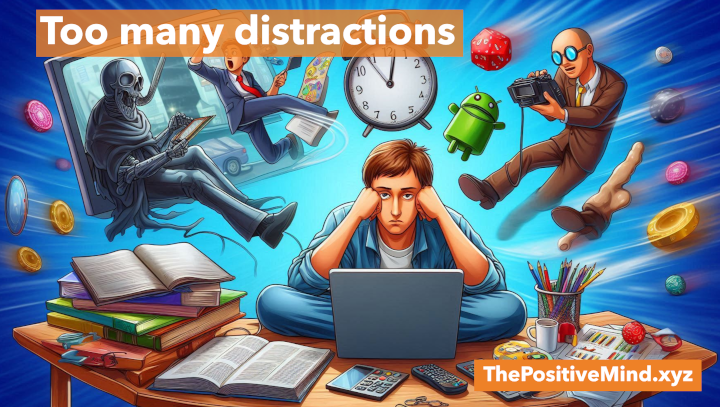How To Overcome Procrastination and the Strategies for Staying on Track
Did you know that approximately 20% of adults are chronic procrastinators? Procrastination isn’t just about putting off tasks; it can have serious impacts on your productivity, stress levels, and overall well-being. It’s a widespread issue that affects people from all walks of life, from students to professionals.
Procrastination is the act of delaying or postponing tasks, often to the last minute. It’s that nagging tendency to put off important responsibilities in favor of more enjoyable or less challenging activities. We’ve all been there, especially today, surrounded by many distractions such as social media, interesting online videos, and TV series. So, we tend to avoid that work project by getting lost in social media or put off a household chore by binge-watching a TV series. While it might provide temporary relief, procrastination can lead to increased stress, missed deadlines, and a feeling of unfulfillment.
In this blog post we’re going to help you understand procrastination better and provide you with practical strategies to overcome it. We’ll explore the reasons behind procrastination, identify common triggers, and offer actionable steps to stay on track. By the end of this read, you’ll have a toolkit of techniques to boost your productivity, reduce stress, and achieve your goals more efficiently. Whether you’re looking to improve your work habits, tackle personal projects, or simply get more done in your day-to-day life, this article will guide you on the path to overcoming procrastination.

Table Of Contents
Understanding Procrastination
Let’s break down procrastination in the simplest terms. Procrastination is when you keep putting off tasks that you know you need to do. Instead of getting started on that important project, you find yourself scrolling through social media, watching funny videos, or doing anything but the task at hand. It’s basically avoiding what needs to be done.
Causes:
So, why do we procrastinate? There are a few common reasons:
- Fear of Failure: Sometimes we’re scared that we won’t do a good job, so we put off starting altogether.
- Lack of Motivation: If a task seems boring or too hard, it’s easy to push it aside for something more fun or easier.
- Feeling Overwhelmed: When a task seems too big or complicated, we might not know where to start, so we just avoid it.
- Perfectionism: If we want everything to be perfect, we might delay starting because we’re worried we can’t meet those high standards.
- Instant Gratification: We’re wired to go for what feels good now, even if it means more stress later. Watching TV or playing games feels good right now, while that task can wait.
Effects:
Procrastination might give you a short-term break, but in the long run, it can really mess things up. Here’s how:
- Increased Stress: The longer you put things off, the more they pile up, and the more stressed you feel.
- Missed Deadlines: Waiting until the last minute can mean rushing and missing deadlines, which can lead to trouble at work or school.
- Lower Quality Work: Rushing to finish something often means you don’t do your best work.
- Feeling Guilty: Knowing you’re putting things off can make you feel guilty or bad about yourself.
- Impact on Well-Being: Constantly stressing about unfinished tasks can take a toll on your mental and physical health.
So, understanding why we procrastinate and how it affects us can help us find ways to overcome it and get things done more efficiently.
Identifying Your Procrastination Triggers
Self-Assessment:
Let’s start with a little self-check. Think about the last few times you put something off. What were you doing instead? How were you feeling? Jot down a few notes. This can help you spot patterns and figure out why you keep procrastinating.
Common Triggers:
Here are some common reasons people procrastinate:
- Overwhelming Tasks: If something seems too big or complicated, it’s easy to avoid it.
- Perfectionism: If you’re afraid of not doing something perfectly, you might put it off to avoid the pressure.
- Boredom: Tasks that are boring can be hard to start because they just don’t seem interesting.
- Distractions: Social media, TV, and other fun stuff can pull you away from what you need to do.
- Fear of Failure: Worrying that you might mess up can make you not want to start at all.
Awareness:
Knowing what triggers your procrastination is the first step to beating it. When you’re aware of why you’re putting things off, you can start to tackle those reasons head-on. For example, if you know that overwhelming tasks make you procrastinate, you can break them into smaller, more manageable pieces. Being aware helps you catch yourself in the act and choose to do something different.
Effective Strategies for Overcoming Procrastination
Break Tasks into Smaller Steps:
Got a big task that’s freaking you out? Break it down into smaller, bite-sized pieces. Instead of thinking about writing a whole report, focus on writing just the introduction. Smaller steps are easier to tackle and make the whole thing feel less scary.
Set Clear Goals and Deadlines:
Don’t just say, “I’ll do it later.” Set a specific goal and a deadline. Instead of “I’ll start exercising,” say “I’ll go for a 30-minute walk every day at 6 PM.” Deadlines create a sense of urgency and keep you accountable.
Use Time Management Techniques:
Time management can be your best friend. Try the Pomodoro Technique: work for 25 minutes, then take a 5-minute break. Repeat. Or use time blocking: set specific times in your day for specific tasks. It helps you stay focused and productive.
Prioritize Tasks:
Not everything on your to-do list is equally important. Figure out what needs to be done first and tackle those tasks. Focus on what really matters and what will have the biggest impact.
Eliminate Distractions:
Distractions are the enemy. Turn off your phone notifications, close unnecessary tabs on your computer, and create a workspace that helps you focus. If you’re easily distracted by noise, try using headphones or find a quieter spot.
Practice Self-Compassion:
Don’t beat yourself up over past procrastination. We all procrastinate sometimes. Be kind to yourself, acknowledge what happened, and move on. It’s more important to focus on what you can do now to improve.
By breaking tasks down, setting clear goals, managing your time, prioritizing, eliminating distractions, and being kind to yourself, you can kick procrastination to the curb and start getting things done.
Tools and Resources to Stay on Track
Productivity Apps:
There are some cool apps out there that can help you stay on top of things. Check out Trello and Todoist. Trello lets you organize your tasks on boards, so you can see everything you need to do at a glance. Todoist is great for making to-do lists and setting reminders. These apps can help you manage your time and stay focused on what needs to get done.
Planners and Journals:
Sometimes, good old pen and paper can be just as effective. Using a planner or journal can help you keep track of your tasks and see your progress. Write down what you need to do each day and check things off as you go. It feels good to see those check marks add up!
Accountability Partners:
Having someone to keep you accountable can be a game-changer. Find a friend or coworker who also wants to stay on track and agree to check in with each other regularly. You can share your goals and progress, and give each other a nudge when you’re slacking. It’s easier to stay motivated when you know someone’s got your back.
Maintaining Long-Term Motivation
Celebrate Small Wins:
Hey, don’t wait until the big goal is done to celebrate. Did you finish a chapter of that report? High five! Did you finally clean out that closet? Treat yourself! Celebrating small wins keeps you pumped up and shows you’re making progress, which is super motivating.
Visualize Success:
Picture yourself hitting that big goal. Imagine how awesome it will feel to finally get that promotion, finish that project, or hit your fitness goal. Seeing it in your mind can keep you excited and focused. It’s like giving your brain a sneak peek of the reward.
Regular Review and Adjustments:
Life happens, and plans change. Take some time every week or month to check in on your goals. Are you on track? Is something not working? Make adjustments as needed. This way, you stay flexible and keep moving forward without getting stuck or frustrated.
When you’re in the midst of achieving your goal, you’ve gotta find ways to keep yourself motivated, or else it’s easy to lose steam. If you’re not celebrating the small wins, visualizing success, and regularly reviewing your progress, you might find yourself feeling burnt out or losing sight of why you started in the first place. Keep those motivational tricks in your back pocket to stay on track and push through to the finish line.
Common Pitfalls and How to Avoid Them
Perfectionism:
Getting stuck on making everything perfect is a big trap. You might spend so much time trying to get every little detail right that you never actually finish anything. The key is to remember that done is better than perfect. Aim for progress, not perfection. It’s okay if things aren’t flawless; what matters is that you’re moving forward.
Overplanning:
Planning is great, but don’t get caught up in planning every tiny detail. Overplanning can actually lead to procrastination because you’re spending all your time planning and none of it doing. Find a balance by making a simple plan and then taking action. Adjust as you go along instead of trying to plan for every possible scenario.
Burnout:
Working non-stop might seem like the way to get things done, but it can lead to burnout. When you’re burnt out, you’re too exhausted to be productive. It’s crucial to take breaks and give yourself time to recharge. Schedule in some downtime and make sure you’re not pushing yourself too hard.
We’re All Human:
We all have our moments of messing up, getting stuck, or feeling overwhelmed. It’s important to remember that it’s okay to make mistakes and face challenges. What counts is how you bounce back. Be kind to yourself and use these strategies to keep moving forward. Perfection isn’t the goal but progress is.
Conclusion
Recap:
Alright, let’s wrap this up. We’ve talked about what procrastination is, why it happens, and how it messes with your productivity and stress levels. We’ve gone over some solid strategies to tackle procrastination, like breaking tasks into smaller chunks, setting clear goals, and using time management tricks. Plus, we touched on how to stay motivated and avoid common pitfalls like perfectionism and burnout.
Encouragement:
Now it’s your turn to take action! Don’t just read about these tips and you must start using them. Break down that big project, set a deadline for yourself, and try out some time management techniques. Remember, the goal is progress, not perfection. And I repeat once again “the goal is progress, not perfection“!
Call to Action:
So, what’s next? Try picking one of the strategies we talked about today and put it into practice. Maybe download a productivity app or start using a planner. If you’re up for it, share your experiences or any tips you’ve picked up in the comments. Let’s keep this conversation going and support each other in getting things done!

One thought on “How To Overcome Procrastination and the Strategies for Staying on Track”